Betriebliche Dynamiken und Beschäftigungsergebnisse
Firmengründungen und -schließungen sind in einer Marktwirtschaft für die Reallokation von Ressourcen, strukturellen Wandel und damit für die wirtschaftliche Entwicklung von zentraler Bedeutung und spielen vor allem im Hinblick auf die wirtschaftliche Transformation Ostdeutschlands eine zentrale Rolle. Gleichzeitig können die mit dem Strukturwandel verbundenen Arbeitsplatzverluste dramatische Folgen für betroffene Arbeitnehmer haben, wie z.B. Arbeitslosigkeit, Einkommensverluste oder eine geringere Arbeitsplatzqualität. Diese Forschungsgruppe untersucht mithilfe mikroökonometrischer Methoden Gründungen, Wachstumsprozesse und das Scheitern von Unternehmen, die Anzahl und Qualität der von Neugründungen geschaffenen Arbeitsplätze und die Folgen von Firmenschließungen für betroffene Arbeitnehmer und Arbeitnehmerinnen, vor allem in Bezug auf Arbeitsmarktergebnisse wie Beschäftigung und Löhne.
Forschungscluster
Produktivität und InstitutionenIhr Kontakt

Mitglied - Abteilung Strukturwandel und Produktivität
PROJEKTE
01.2020 ‐ 06.2024
Europas populistische Parteien im Aufwind: die dunkle Seite von Globalisierung und technologischem Wandel?
VolkswagenStiftung
Die Globalisierung hat zwar allgemein den Wohlstand gesteigert, aber in vielen Regionen Europas auch zu Arbeitslosigkeit, Lohnungleichheit, Abwanderung und Überalterung geführt. Das Projekt untersucht, ob diese ökonomischen Lasten zu Wählerstimmen für populistische Parteien führen.
01.2019 ‐ 06.2022
MICROPROD („Raising EU Productivity: Lessons from Improved Micro Data“)
Europäische Kommission
Ziel von MICROPROD ist es, zu einem besseren Verständnis der Herausforderungen beizutragen, die die vierte industrielle Revolution in Europa mit sich bringt. Verliert das Produktivitätswachstum im Kontext von Globalisierung und Digitalisierung an Schwung, und wenn ja, warum?
This project has received funding from the European Union’s Horizon 2020 research and innovation programme under grant agreement No 764810.
07.2018 ‐ 12.2020
Firmenlohndifferentiale in unvollkommenen Arbeitsmärkten: Die Rolle von Marktmacht und industriellen Beziehungen in der Aufteilung der Beschäftigungsrenten zwischen Arbeitnehmern und Arbeitgebern
Deutsche Forschungsgemeinschaft (DFG)
Ziel dieses Projekts ist es, die Aufteilung der Beschäftigungsrenten auf unvollkommenen Arbeitsmärkten und den Einfluss von Arbeitsmarktinstitutionen wie Tarifbindung und betrieblicher Mitbestimmung auf Firmenlohndifferentiale zu untersuchen. Über die Grundlagenforschung hinaus hat das Projekt damit Potential, wichtige wirtschaftspolitische Debatten zur institutionellen Ausgestaltung des Lohnfindungsprozesses zu informieren.
02.2019 ‐ 09.2019
Auswertung des IAB-Betriebspanels 2018 und Erstellung eines Ergebnisberichts für West- und Ostdeutschland
04.2016 ‐ 03.2019
Lohn- und Beschäftigungseffekte von Insolvenzen
Deutsche Forschungsgemeinschaft (DFG)
Ziel des Projekts ist es, erstmals den Prozess und die Folgen des Scheiterns von Unternehmen ausführlich zu analysieren. Insbesondere ist es im Rahmen dieses Projekts erstmals möglich, die Folgen kleinbetrieblicher Insolvenzen zu erforschen, was vor allem deshalb relevant ist, weil Arbeitnehmer in Betrieben mit weniger als zehn Beschäftigten etwa viermal so häufig von Insolvenzen betroffen sind wie Arbeitnehmer in Großbetrieben.
01.2018 ‐ 12.2018
Auswertung des IAB-Betriebspanels 2017 und Erstellung eines Ergebnisberichts für West- und Ostdeutschland
01.2017 ‐ 09.2017
Auswertung des IAB-Betriebspanels 2016 und Erstellung eines Ergebnisberichts für West- und Ostdeutschland
Referierte Publikationen
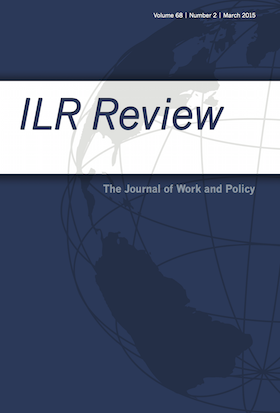
Do Start-ups Provide Employment Opportunities for Disadvantaged Workers?
in: ILR Review, Nr. 5, 2019
Abstract
This article compares the hiring patterns of start-ups and incumbent firms to analyze whether start-ups offer relatively more job opportunities to disadvantaged workers. Using administrative linked employer–employee data for Germany that provide the complete employment biographies of newly hired workers, the authors show that young firms are more likely than incumbents to hire applicants who are older, foreign, or unemployed, or who have unstable employment histories, arrive from outside the labor force, or were affected by a plant closure. Analysis of entry wages shows that penalties for these disadvantaged workers, however, are higher in start-ups than in incumbent firms. Therefore, even if start-ups provide employment opportunities for certain groups of disadvantaged workers, the quality of these jobs in terms of initial remuneration appears to be low.
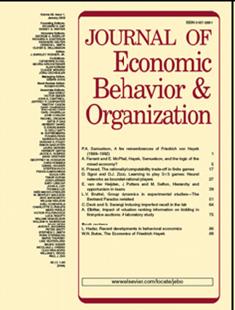
The Internet Effects on Sex Crime Offenses – Evidence from the German Broadband Internet Expansion
in: Journal of Economic Behavior and Organization, September 2019
Abstract
This paper studies the effects of the introduction of a new mass medium on sex crime in Germany. I use unique data on criminal offenses and broadband internet measured at the municipal level to shed light on this issue. In order to address endogeneity in broadband internet availability, I exploit technical peculiarities at the regional level that determine the roll-out of high-speed internet. Results provide evidence of a substitution effect of internet exposure on sex crime. The substitution effect is neither driven by differences in reporting behavior, nor by matching processes at the victim and offender side. This suggests that the consumption of extreme media plays an important role in explaining the documented high-speed internet effect.
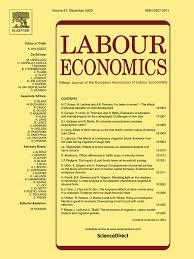
Does Extended Unemployment Benefit Duration Ameliorate the Negative Employment Effects of Job Loss?
in: Labour Economics, 2019
Abstract
We study the effect of job displacement due to bankruptcies on earnings and employment prospects of displaced workers and analyse whether extended potential unemployment benefit duration (PBD) ameliorates the negative consequences of job loss. Using German administrative linked employer-employee data, we find that job loss has long-lasting negative effects on earnings and employment. Displaced workers also more often end up in irregular employment relationships (part-time, marginal part-time employment, and temporary agency work) than their non-displaced counterparts. Applying a regression discontinuity approach that exploits a three months PBD extension at the age threshold of 50 we find hardly any effects of longer PBD on labour market outcomes of displaced workers.

HIP, RIP, and the Robustness of Empirical Earnings Processes
in: Quantitative Economics, Nr. 3, 2019
Abstract
The dispersion of individual returns to experience, often referred to as heterogeneity of income profiles (HIP), is a key parameter in empirical human capital models, in studies of life‐cycle income inequality, and in heterogeneous agent models of life‐cycle labor market dynamics. It is commonly estimated from age variation in the covariance structure of earnings. In this study, I show that this approach is invalid and tends to deliver estimates of HIP that are biased upward. The reason is that any age variation in covariance structures can be rationalized by age‐dependent heteroscedasticity in the distribution of earnings shocks. Once one models such age effects flexibly the remaining identifying variation for HIP is the shape of the tails of lag profiles. Credible estimation of HIP thus imposes strong demands on the data since one requires many earnings observations per individual and a low rate of sample attrition. To investigate empirically whether the bias in estimates of HIP from omitting age effects is quantitatively important, I thus rely on administrative data from Germany on quarterly earnings that follow workers from labor market entry until 27 years into their career. To strengthen external validity, I focus my analysis on an education group that displays a covariance structure with qualitatively similar properties like its North American counterpart. I find that a HIP model with age effects in transitory, persistent and permanent shocks fits the covariance structure almost perfectly and delivers small and insignificant estimates for the HIP component. In sharp contrast, once I estimate a standard HIP model without age‐effects the estimated slope heterogeneity increases by a factor of thirteen and becomes highly significant, with a dramatic deterioration of model fit. I reach the same conclusions from estimating the two models on a different covariance structure and from conducting a Monte Carlo analysis, suggesting that my quantitative results are not an artifact of one particular sample.
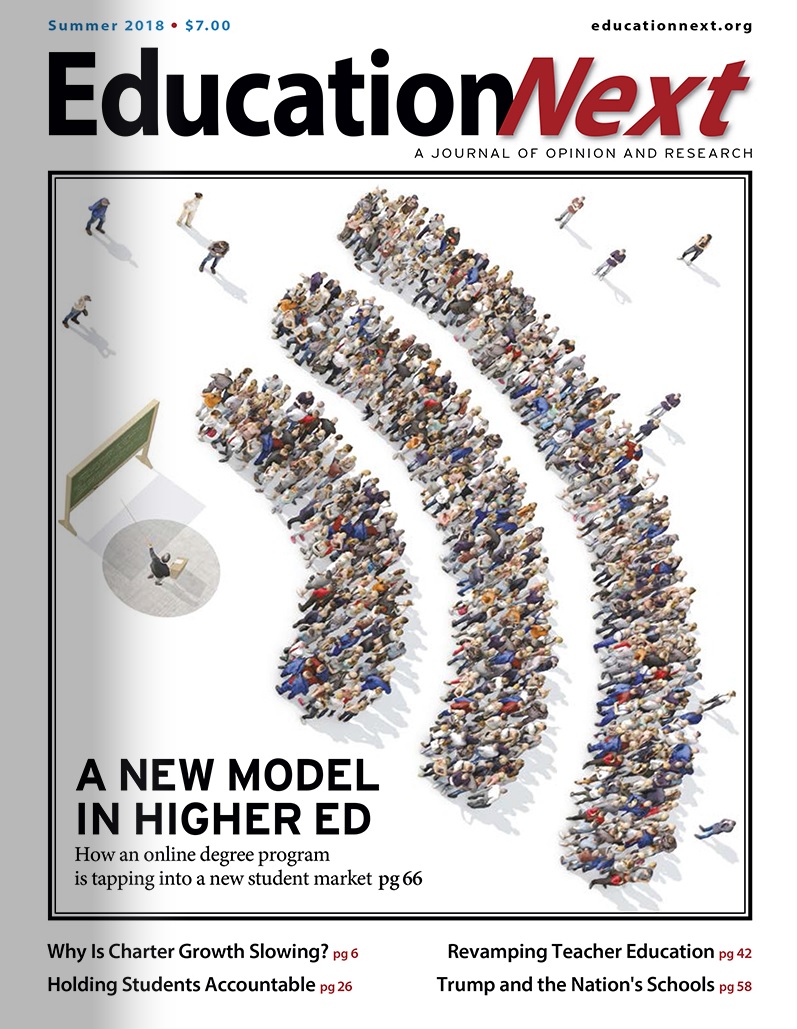
Do Smarter Teachers Make Smarter Students?
in: Education Next, Nr. 2, 2019
Abstract
Student achievement varies widely across developed countries, but the source of these differences is not well understood. One obvious candidate, and a major focus of research and policy discussions both in the United States and abroad, is teacher quality.
Arbeitspapiere
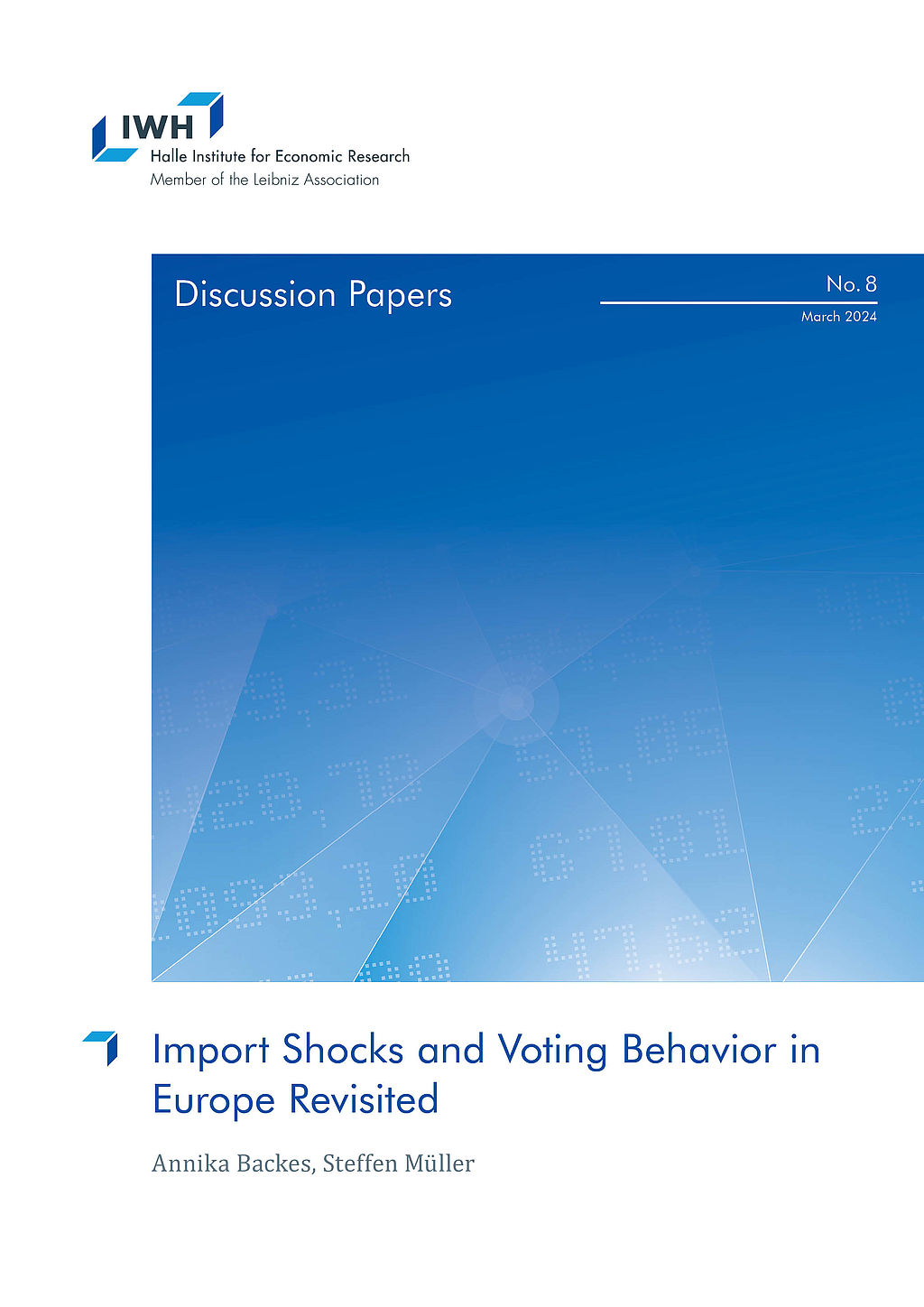
Import Shocks and Voting Behavior in Europe Revisited
in: IWH Discussion Papers, Nr. 8, 2024
Abstract
We provide first evidence for the long-run causal impact that Chinese imports to European regions had on voting outcomes and revisit earlier estimates of the short-run impact for a methodological reason. The fringes of the political spectrum gained ground many years after the China shock plateaued and, unlike an earlier study by Colantone and Stanig (2018b), we do not find any robust evidence for a short-run effect on far-right votes. Instead, far-left and populist parties gained in the short run. We identify persistent long-run effects of import shocks on voting. These effects are biased towards populism and, to a lesser extent, to the far-right.
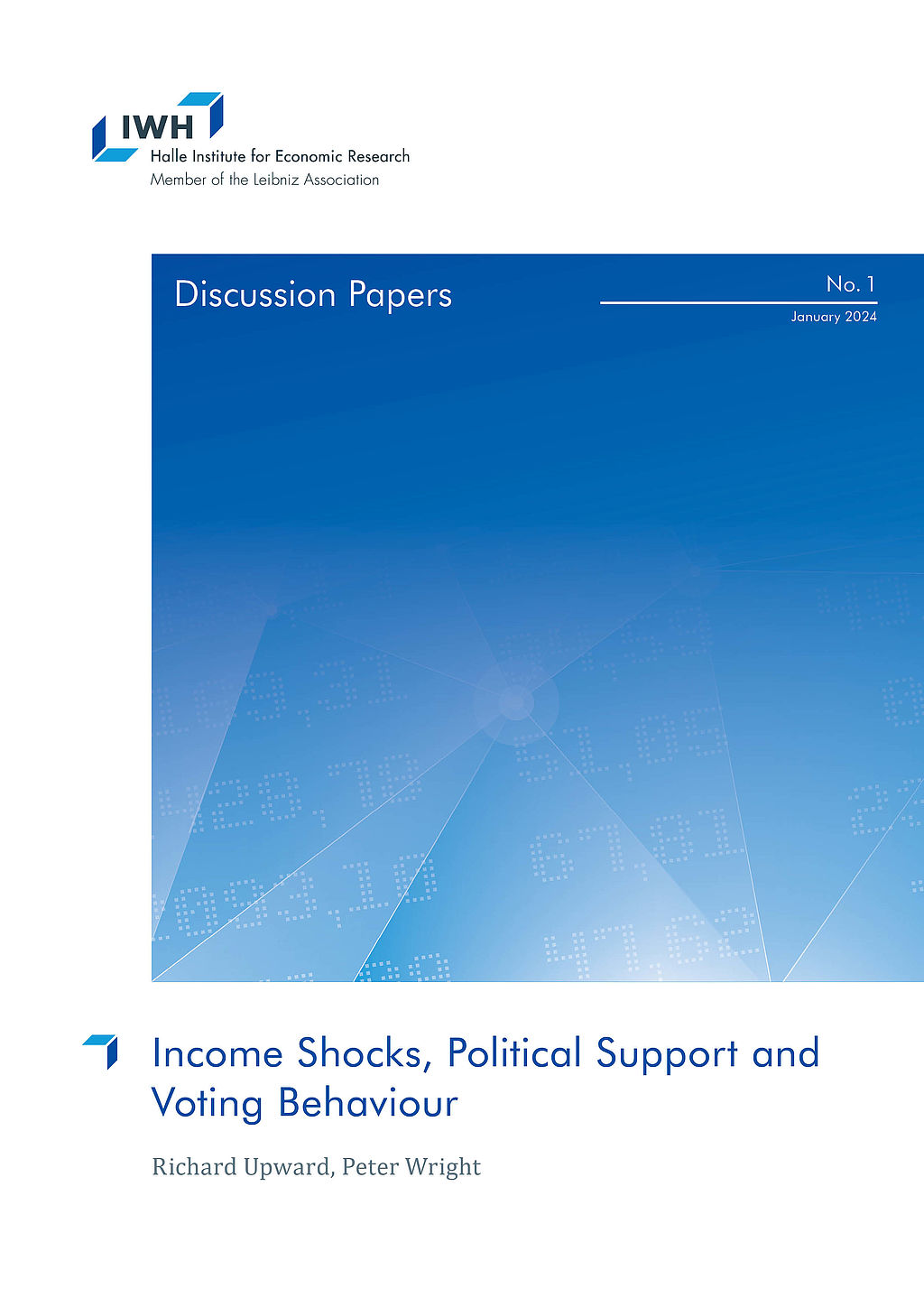
Income Shocks, Political Support and Voting Behaviour
in: IWH Discussion Papers, Nr. 1, 2024
Abstract
We provide new evidence on the effects of economic shocks on political support, voting behaviour and political opinions over the last 25 years. We exploit a sudden, large and long-lasting shock in the form of job loss and trace out its impact on individual political outcomes for up to 10 years after the event. The availability of detailed information on households before and after the job loss event allows us to reweight a comparison group to closely mimic the job losers in terms of their observable characteristics, pre-existing political support and voting behaviour. We find consistent, long-lasting but quantitatively small effects on support and votes for the incumbent party, and short-lived effects on political engagement. We find limited impact on the support for fringe or populist parties. In the context of Brexit, opposition to the EU was much higher amongst those who lost their jobs, but this was largely due to pre-existing differences which were not exacerbated by the job loss event itself.
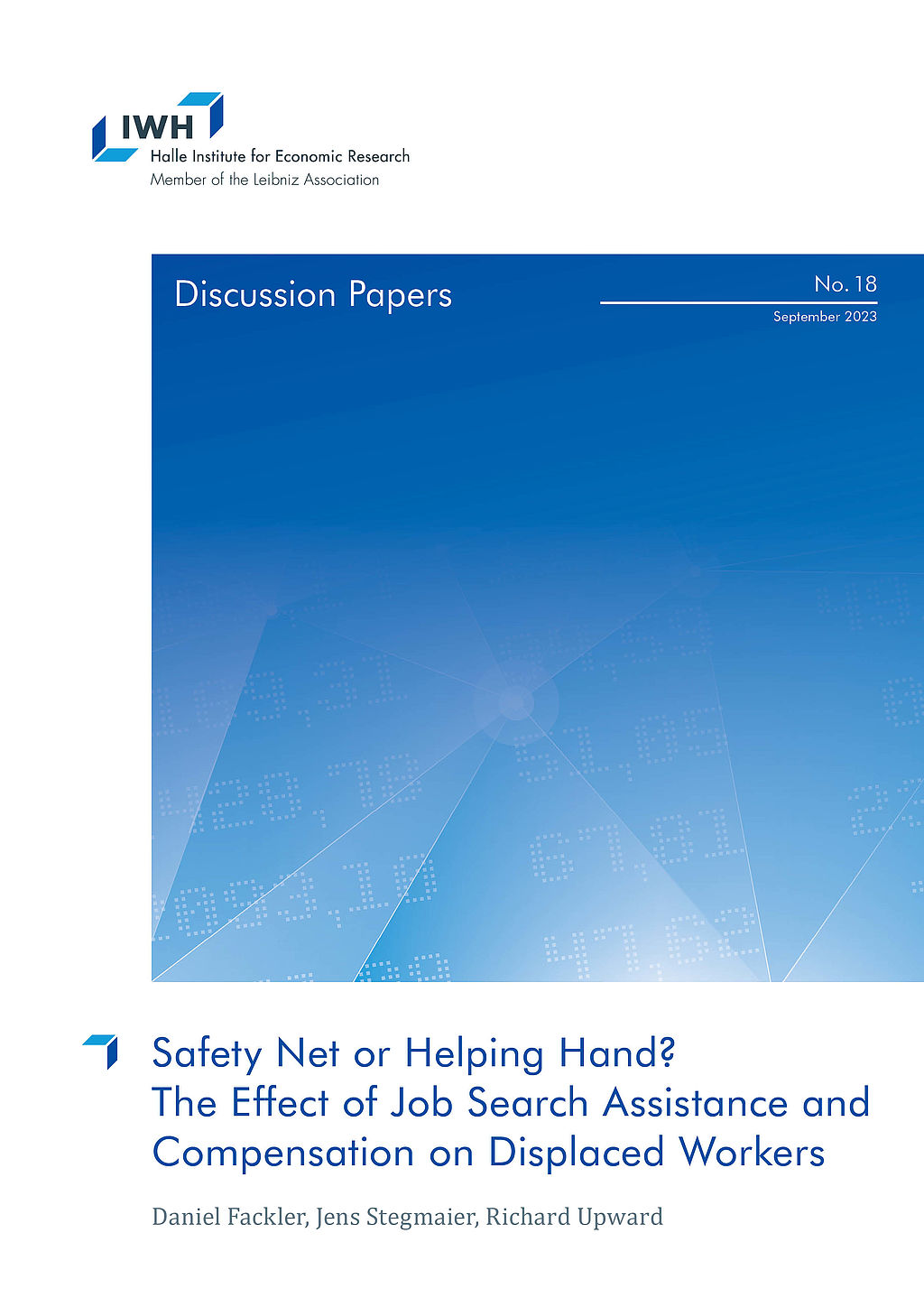
Safety Net or Helping Hand? The Effect of Job Search Assistance and Compensation on Displaced Workers
in: IWH Discussion Papers, Nr. 18, 2023
Abstract
We provide the first systematic evidence on the effectiveness of a contested policy in Germany to help displaced workers. So-called “transfer companies” (<i>Transfergesellschaften</i>) employ displaced workers for a fixed period, during which time workers are provided with job-search assistance and are paid a wage which is a substantial fraction of their pre-displacement wage. Using rich and accurate data on workers’ employment patterns before and after displacement, we compare the earnings and employment outcomes of displaced workers who entered transfer companies with those that did not. Workers can choose whether or not to accept a position in a transfer company, and therefore we use the availability of a transfer company at the establishment level as an IV in a model of one-sided compliance. Using an event study, we find that workers who enter a transfer company have significantly worse post-displacement outcomes, but we show that this is likely to be the result of negative selection: workers who lack good outside opportunities are more likely to choose to enter the transfer company. In contrast, ITT and IV estimates indicate that the use of a transfer company has a positive and significant effect on employment rates five years after job loss, but no significant effect on earnings. In addition, the transfer company provides significant additional compensation to displaced workers in the first 12 months after job loss.
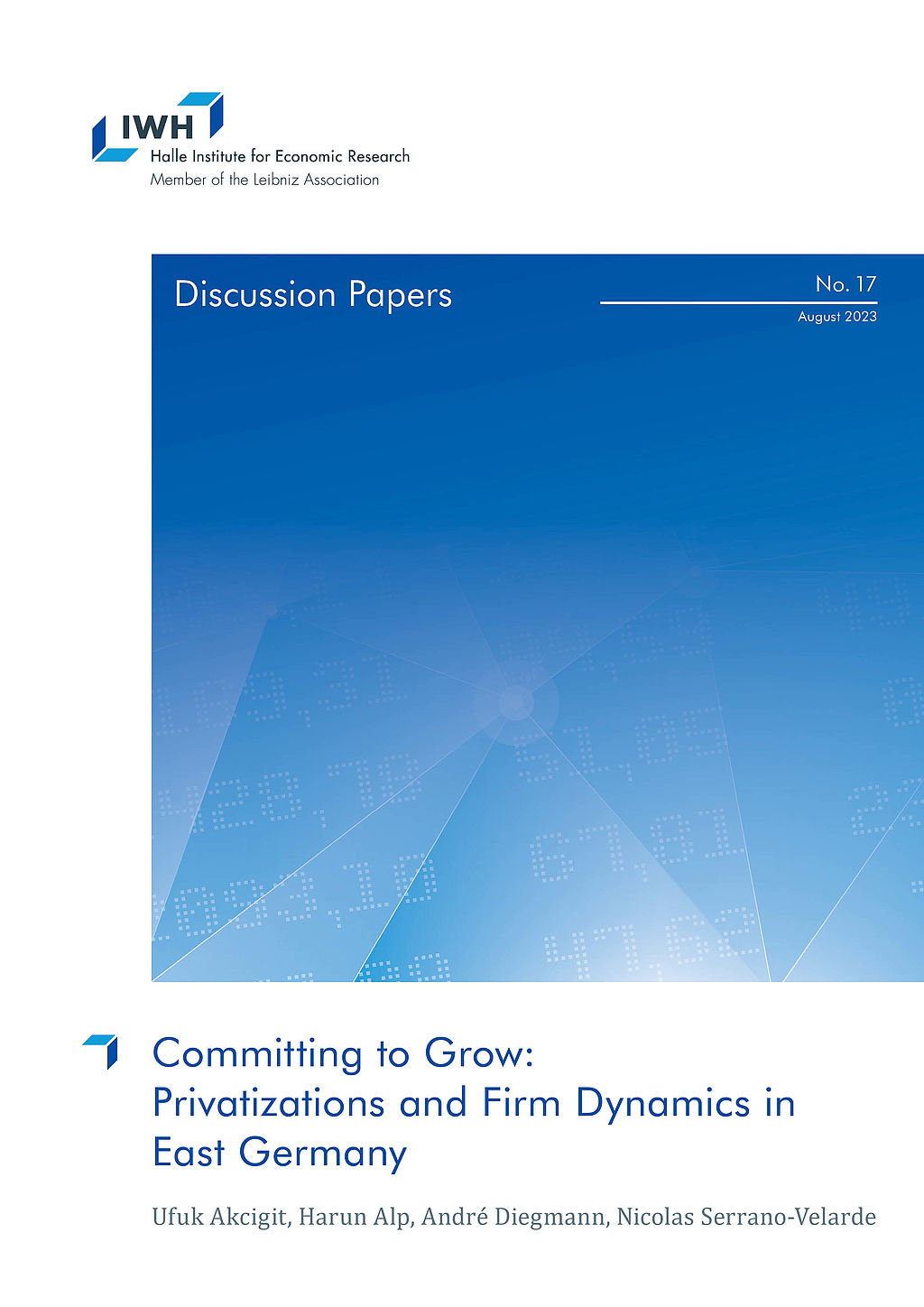
Committing to Grow: Privatizations and Firm Dynamics in East Germany
in: IWH Discussion Papers, Nr. 17, 2023
Abstract
This paper investigates a unique policy designed to maintain employment during the privatization of East German firms after the fall of the Iron Curtain. The policy required new owners of the firms to commit to employment targets, with penalties for non-compliance. Using a dynamic model, we highlight three channels through which employment targets impact firms: distorted employment decisions, increased productivity, and higher exit rates. Our empirical analysis, using a novel dataset and instrumental variable approach, confirms these findings. We estimate a 22% points higher annual employment growth rate, a 14% points higher annual productivity growth, and a 3.6% points higher probability of exit for firms with binding employment targets. Our calibrated model further demonstrates that without these targets, aggregate employment would have been 15% lower after 10 years. Additionally, an alternative policy of productivity investment subsidies proved costly and less effective in the short term.
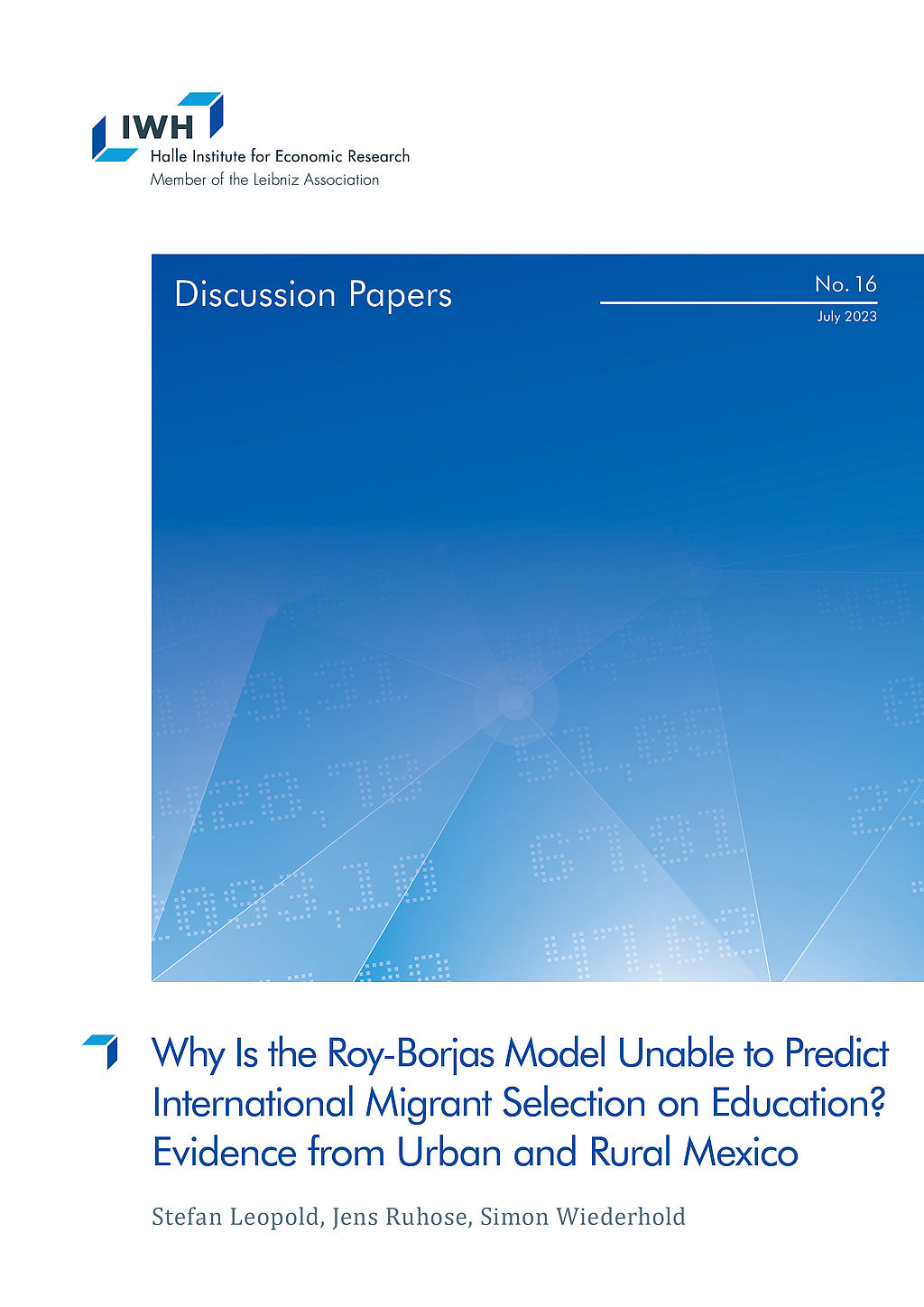
Why Is the Roy-Borjas Model Unable to Predict International Migrant Selection on Education? Evidence from Urban and Rural Mexico
in: IWH Discussion Papers, Nr. 16, 2023
Abstract
The Roy-Borjas model predicts that international migrants are less educated than nonmigrants because the returns to education are generally higher in developing (migrant-sending) than in developed (migrant-receiving) countries. However, empirical evidence often shows the opposite. Using the case of Mexico-U.S. migration, we show that this inconsistency between predictions and empirical evidence can be resolved when the human capital of migrants is assessed using a two-dimensional measure of occupational skills rather than by educational attainment. Thus, focusing on a single skill dimension when investigating migrant selection can lead to misleading conclusions about the underlying economic incentives and behavioral models of migration.


















